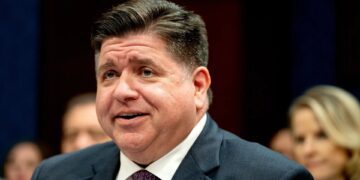By Nancy Thorner –
Our Founding Fathers created the Electoral College after much debate and compromise, but it has provided stability to the process of picking presidents. Though the winner of the national popular vote typically takes the presidency, that vote failed to determine the winner in four elections: 1824, 1876, 1888, and 2000. Add also 2016.
The Electoral College and how it should operate in electing a president is defined in Article II, Section 1, Clause 3 of our U.S. Constitution. As such our Founding Fathers set a high bar for amending the Constitution, a process that doesn't even require the approval of the president or Congress, but only the approval of state legislatures.
The Electoral College is not a place but a process. As a process the Electoral College consists of 1) the selection of the electors, 2) the meeting of the electors where they vote for President and Vice President, 3) and the counting of the electoral votes by Congress. Our Founding Fathers established it in the Constitution as a compromise between election of the President by a vote in Congress and election of the President by a popular vote of qualified citizens.
538 electors make up the Electoral College. A majority of 270 electoral votes is required to elect the President. Each state’s entitled allotment of electors equals the number of members in its Congressional delegation: one for each member in the House of Representatives, plus two for your Senators. Because of the Electoral College system states are empowered, especially smaller ones, as it incentivizes presidential candidates to appeal to places that may be far away from population centers. If there were no Electoral College system, the Trump campaign, or any campaign, would need to be structured quite differently. Presidential candidates would then camp out in the big cities in NY, TX, CA, FL where the largest number of Electoral College votes are found, and ignore the balance of the states and nearly 95% of the cities in the country.
Our Founding Fathers were brilliant as they foresaw the concentration of population as something to account for in the Constitution. Without the Electoral College safeguarding against undue influence of the illegal immigrant vote based on the lax voting system found in California, Trump could not have won.
Whenever we hear others say that the Electoral College isn’t democratic, our response should not be one of denial, but we must explain why. Many voters will be surprised to learn that when they step into a ballot box to select their candidate for president, they actually are casting votes for electors. Likewise greatly misunderstood is that this nation is not a democracy but rather a Constitutional or a Federal Republic. In the entire executive and judicial branches, only two officials are elected, the president and vice president. All the rest are appointed. Thomas Jefferson understood that consent could not be reduced to simple majority or plurality rule.
Unhinged Left has no bounds
Current happenings indicate that the felt desperation of some “Never Trump" Republicans, and especially the unhinged Left, has no bounds They are trying to derail Trump's Electoral College victory with schemes now in progress, which will not succeed, 1) to recount votes by Green Party candidate Jill Steyn in three state Trump won by margins that didn't trigger a mandatory recount, and 2) attempts to have state Electoral College members betray the will of voters by voting instead for Hillary (as did an Electoral College member from Texas), to block official certification of the 270 Electoral College votes needed to certify Trump as the president-elect.
One organization, National Popular Vote, is now at work toward eliminating the Electoral College through an amendment to the Constitution or a state compact. Al Gore recently spoke about the "National Popular Vote Interstate Compact" as a way to abandon the Electoral College for the popular vote. Al Gore believes that the U.S. will switch to popular vote elections within the next decade and that such a change could "bring our democracy back to life."
As that great icon of conservatism, Phyllis Schlafly, founder of Eagle Forum wrote in May 2009:
Many liberals and globalists don't like our Constitution because it contains built-in stumbling blocks against their goals of big government and even global government. Even some conservative types express irritation with our Constitution when they cannot get Congress to pass the legislation they desire. So, different factions, seeking different goals, have turned to an attempt to use the never-used provision in the Constitution's Article V, which requires Congress to call a new Constitutional Convention if two-thirds (34) of the states pass resolutions calling for it. This is colloquially called a Con Con.
Lurking behind the call for a Constitution convention by Con Con instigators
Calls to fundamentally change the Electoral College, as set forth in Article V of the Constitution to call a Constitutional convention (Con Con), reached a peak after Republican George W. Bush defeated Democrat Al Gore in the tightly contested 2000 election. Gore narrowly won the national popular vote, and many of his supporters howled that the system—even without the Supreme Court stepping in—was unfair.
Over 220 years, various states have passed hundreds of resolutions asking Congress to call a Con Con to change aspects of the Constitution that they find objectionable, but no single topic ever passed in 2/3rds of the states.
In that Hillary won the popular vote in this year's presidential election sparked renewed interest in calling for an Article V Con Con. Eight states have already passed a resolution as set forth in Article V of the Constitution to call a Constitutional Convention (Con Con) under the guise that Washington D.C. is broken and it's time to take the power back from the political elites.
There are those among the Republican ranks who believe they now have a mandate to use Article V to bring power back to "We the people." With Republicans now in control of 69 of the 99 state legislative chambers, the assumption is that securing the remaining 26 states needed to call a convention should be well within the realm of possibility. Thirty-four state legislatures must be on board to call a Convention of the States.
Andy Schlafly of Eagle Forum expects a big fight in Texas over calling a Convention of States, as well as in other states like Missouri, Utah, Wisconsin, and Michigan. The ConConners are sending out mass emails pretending to be anti-Establishment, when in fact they have secret globalists like George Soros funding their scheme. Now they have Jeb Bush and his anti-Trump vendetta pushing the Con Con agenda. The Constitution must be defended against this attack.
Constitutions written and waiting for a Con Con
Jeb Bush's endorsement of a constitutional convention last month in the Wall Street Journal, "Where Republicans Go From Here", demands a further examination of possible Bush family interests. As establishment Republicans, Bush family members did turn their backs on Donald Trump and were prepared to allow Hilary Clinton to win the election by default.
For consideration: One of the first major political events that President G.W. Bush was involved in when he took office was the Summit of the Americas, held in Quebec City, April 20-22, 2001. At this time G.W. put into action one of his main campaign platforms, an expanded trade program, which he said would revitalize America's slumping economy. This was the same economic agenda pushed by his father, G.H. Bush and Bill Clinton. The goals were the same — a One World Government. Under the planned North American Union, Canada, the United States, and Mexico will surrender their sovereignty to a Parliament set over the three countries. The United States does need a new Constitution to transform this nation from a sovereign nation to a member state of the North American Union. It’s about Re-zoning the World: The Merging of the Americas in a New Global Order.
Other Constitutions written and waiting to be introduced if and when a Constitutional Convention is called:
1. The Revolutionary Communist Party USA has a Constitution for The New Socialist Republic in North America.
2. George Soros, and Marxist law professors all over the country, want a Marxist Constitution in place by the year 2020.
Uncontrollable nature of Con Con like playing with fire
Because of the uncontrollable nature of a Con Con, should a call for a convention succeed, the only issues might be whose Constitution will be imposed by the delegates and what new mode of ratification will be set forth in the new Constitution. Why is this so?
- There is no way to control a Con Con in advance or to require it to consider only one subject. The Article V provision that authorizes the calling of a Con Con refers to considering "amendments" (note the plural).
- If Congress called a Con Con to consider only one issue, the Convention delegates can ignore the instruction, set their own agenda, and make their own rules.
- It is not credible that various politically active groups would pass up the chance to try to force a Con Con to vote for their special interests. It's not believable that the powerful forces working to take away our right to own guns would overlook a golden opportunity to eliminate the Second Amendment.
As noted above, it is impossible for Congress or state applications to restrict what a Con Con does. The late Chief Justice Warren Burger wrote: "There is no effective way to limit or muzzle the actions of a Constitutional Convention. . . . After a Convention is convened, it will be too late to stop the Convention if we don't like its agenda." (Read the entire Burger letter here.)
Consider also Antonin Scalia's warning about a Constitution Convention. When appearing on an episode of The Kalb Report with Ruth Bader Ginsburg on April 17, 2014, Scalia acknowledged the difficulty of amending the Constitution in the context of amendments, Scalia clearly warned against the notion of a convention, which is the second, or alternative, method for amending the Constitution under Article V.
It is important to recall what happened in the Convention of 1787. Called by the Continental Congress for the sole and express purpose of proposing a revision to the Articles of Confederation, the delegates chose to ignore their charge and instead wrote a new Constitution
As expressed in Phyllis Schlafly's article in May of 2009:
We don't see any James Madisons, George Washingtons, Ben Franklins or Alexander Hamiltons around today who could do as good a job as was done in 1787, and we should be leery about the politicians who think they can improve on our Founding Fathers. A call for a Constitutional Convention is a terrible idea and should be defeated in every state legislature where it rears its ugly head.
If President-elect Trump can't lead the promising team he is bringing together to fulfill a conservative wish list, with majorities in both Houses, and on the verge of having a right-leaning Supreme Court behind him, what chance does Con Con promoter Mark Levin and his flying monkeys have of instilling conservative principles by calling a Con Con?







